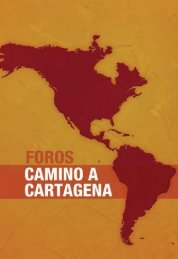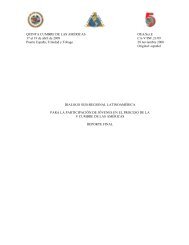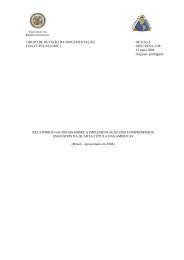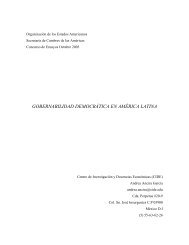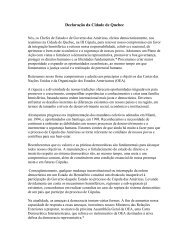The Road to Hemispheric Cooperation: Beyond the Cartagena
The Road to Hemispheric Cooperation: Beyond the Cartagena
The Road to Hemispheric Cooperation: Beyond the Cartagena
Create successful ePaper yourself
Turn your PDF publications into a flip-book with our unique Google optimized e-Paper software.
●● Organized crime. <strong>The</strong> data presented in <strong>the</strong> first sec-<br />
tion of this chapter shows that <strong>the</strong> most acute problems<br />
of homicidal violence are concentrated in nor<strong>the</strong>rn<br />
Latin America (Colombia, Venezuela, <strong>the</strong> Caribbean,<br />
Central America and, increasingly, Mexico). This is precisely<br />
<strong>the</strong> geographic area most affected by <strong>the</strong> international<br />
drug trafficking. Approximately 90 percent of<br />
<strong>the</strong> cocaine entering <strong>the</strong> U.S. market moves through<br />
<strong>the</strong> corridor of Central America and Mexico. 35 About 45<br />
percent of intentional homicides that occurred in Mexico<br />
in 2008-2010 were directly related <strong>to</strong> drug trafficking,<br />
a similar proportion <strong>to</strong> that detected in Guatemala<br />
in 2009. 36 <strong>The</strong> widespread presence of drug trafficking<br />
and organized crime sets <strong>the</strong> backdrop of violence<br />
that is plaguing much, but not all, of <strong>the</strong> hemisphere.<br />
Clearly, organized crime goes beyond <strong>the</strong> operation of<br />
large transnational drug trafficking syndicates, which<br />
routinely attracts headlines. On <strong>the</strong> one hand, <strong>the</strong>re are<br />
o<strong>the</strong>r forms of organized crime in <strong>the</strong> region, notably<br />
human trafficking, that rival drug trafficking in terms of<br />
profitability and whose activities, in many cases, make<br />
use of networks and structures generated by it. 37 On<br />
<strong>the</strong> o<strong>the</strong>r hand, violence levels are affected by <strong>the</strong><br />
presence of local illicit markets fueled by <strong>the</strong> growth in<br />
consumption of narcotics in drug producing or transshipment<br />
countries. 38<br />
<strong>The</strong>se five fac<strong>to</strong>rs are compounded by ano<strong>the</strong>r structural<br />
flaw, which deserves a more detailed treatment: <strong>the</strong> weakness<br />
of law enforcement institutions in much of LAC.<br />
<strong>The</strong> law Enforcement Conundrum<br />
<strong>The</strong> acute problems of effectiveness and integrity of <strong>the</strong><br />
police and <strong>the</strong> courts in Latin America are well known. As<br />
shown in Table 3.1, <strong>the</strong> indica<strong>to</strong>r measuring <strong>the</strong> rule of law<br />
by <strong>the</strong> Global Governance Indica<strong>to</strong>rs by <strong>the</strong> World Bank<br />
yields very poor results for Latin America, separated by a<br />
gulf from <strong>the</strong> countries of <strong>the</strong> European Union as well as<br />
<strong>the</strong> United States and Canada. 39<br />
If <strong>the</strong> gap between Latin America and developed countries<br />
is considerable in this area, even more remarkable is that in<br />
terms of confidence in <strong>the</strong> police and <strong>the</strong> courts, <strong>the</strong> region<br />
lags behind o<strong>the</strong>r regions of <strong>the</strong> developing world, such as<br />
Asia and Africa.<br />
Table 3.1 Effectiveness of <strong>the</strong> Rule of Law in<br />
Latin America 2009<br />
Country Index(*)<br />
Argentina -0.66<br />
Bolivia -1.22<br />
Brazil -0.18<br />
Chile 1.25<br />
Colombia -0.44<br />
Costa Rica 0.56<br />
El Salvador -0.78<br />
Ecuador -1.28<br />
Guatemala -1.12<br />
Honduras -0.87<br />
Mexico -0.57<br />
Nicaragua -0.83<br />
Panama -0.09<br />
Paraguay -0.98<br />
Peru -0.66<br />
Dominican Republic -0.72<br />
Uruguay 0.72<br />
Venezuela -1.59<br />
Latin America -0.53<br />
Europe 1.05<br />
United States of America 1.53<br />
Canada 1.78<br />
(*) Index oscillates between -2.50 and 2.50.<br />
Daniel Kaufmann et al., World Governance Indica<strong>to</strong>rs, 2010. Available<br />
at: http://info.worldbank.org/governance/wgi/index. asp. 40<br />
Adding <strong>to</strong>ge<strong>the</strong>r all <strong>the</strong> different intensities of confidence in<br />
institutions, <strong>the</strong> data in Figures 3.1 and 3.2 underestimate<br />
<strong>the</strong> levels of public trust in <strong>the</strong> region: only 7.5 percent and<br />
5.9 percent of Latin Americans, on average, declare that<br />
<strong>the</strong>y have much confidence in <strong>the</strong> police and <strong>the</strong> courts, respectively.<br />
<strong>The</strong> comparable figures for sub-Saharan Africa<br />
are 29 percent and 33 percent.<br />
One of <strong>the</strong> predictable results of such a level of mistrust is<br />
<strong>the</strong> reluctance <strong>to</strong> report crimes, which, in turn, contributes <strong>to</strong><br />
widespread impunity. In <strong>the</strong> case of Costa Rica, where levels<br />
of confidence in <strong>the</strong> police and courts are comparatively<br />
high in <strong>the</strong> region, only 23 percent of crimes are reported<br />
<strong>to</strong> authorities, a figure that drops <strong>to</strong> 22 percent in Mexico. 41<br />
Impunity is also rooted in <strong>the</strong> minimal results of <strong>the</strong> judicial<br />
system region-wide. Not coincidentally, in Mexico, below 2<br />
percent of offenses result in a sentence—a proportion similar<br />
<strong>to</strong> that detected in Colombia (2.6 percent) some years<br />
<strong>The</strong> <strong>Road</strong> <strong>to</strong> <strong>Hemispheric</strong> <strong>Cooperation</strong>: <strong>Beyond</strong> <strong>the</strong> <strong>Cartagena</strong> Summit of <strong>the</strong> Americas<br />
<strong>The</strong> Brookings Institution ❘ Latin America Initiative<br />
65



